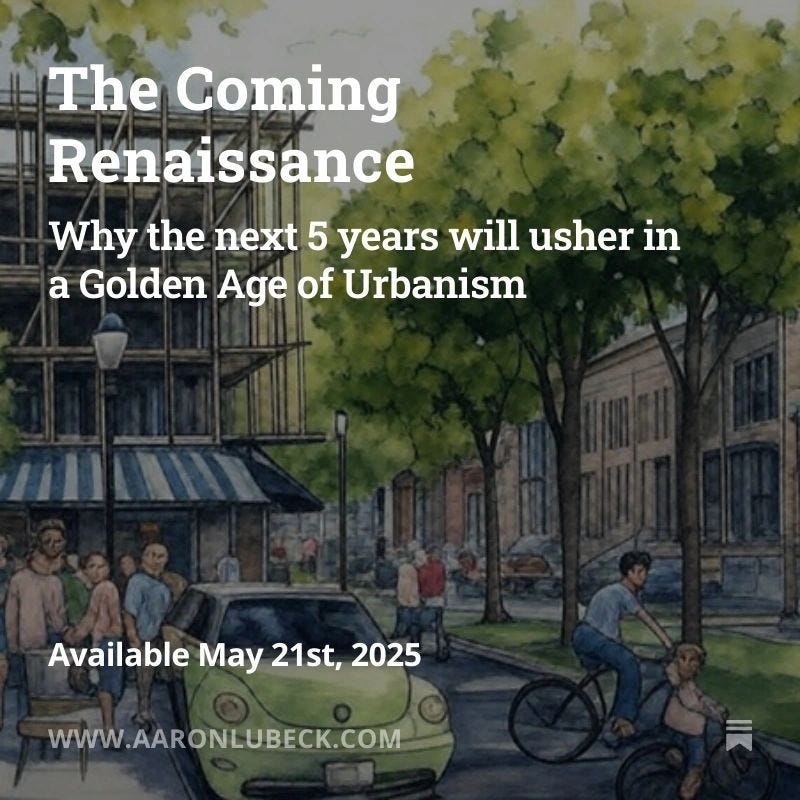“I suspect that the 2030s will be the best decade for American urbanism in a century.”
That’s something I said in a conversation with Geoff Graham on his podcast Yeoman. And I meant it. But it’s not a prediction—it’s a conditional. The next decade could be the new renaissance, our architectural roaring twenties, and our last best chance to build beautiful, affordable cities. But it will only happen if we break the machine that’s been holding us back.
That machine is zoning. Specifically, Euclidean zoning, born from the 1926 Supreme Court case Euclid v. Ambler. That case handed American cities near-total authority to dictate what could—and, more importantly, what couldn’t—be built. On paper, it was about keeping factories away from homes. In practice, it became the blueprint for banning apartments, corner stores, duplexes, and anything that didn’t fit a narrow, tightly controlled vision of static, segregated suburbia.
By granting so much power to government bureaus, Euclid diluted (destroyed?) localism. It stripped citizens of their agency in shaping their own communities. As Geoff said during our conversation, “The most local entity is the individual... it was the highest level overreach that took that individual’s rights away.”
Before Euclid, cities grew the way human places do: one small lot at a time. Typically, one small builder at a time.
Builders and homeowners worked from pattern books, local customs, and need. It wasn’t perfect, but it was organic, and it was alive. After Euclid, change became something that required permission. Creativity became deviance. Risk was criminalized. And over the next century, as Derek Thompson’s book Abundance points out, we buried a thousand great cities under the weight of process.
If we want to build again, we have to undo the legal overreach that made normal citybuilding illegal. We should be exploring radical ways to accomplish this. In the podcast, I suggest the simplest path, a holy grail of reform: Overturning Euclid.
Any constitutional challenge would recognize what the decision got wrong in the first place. Euclid overlooked that America’s historical urban cities were inherently dynamic and growth-oriented. Euclid was anti-change. It presumed that suburbia would be a progressive, modernist utopia, which might have sounded great, but was in all practicality antithetical to every tradition that had preceded it.
WHAT’S THE FIX?
Not every city has to grow. Not every place needs to change. But the ones that want to should be allowed to. And cities, particularly America’s legacy cities, want to grow. That’s their DNA.
Thus, for cities chartered before 1926—before zoning was standardized—zoning would (and should) be invalidated as a taking. Let those cities breathe again. Let them return to their elastic, iterative roots. Let people build, as StrongTowns advocates, the next increment up.
THE YOUTH ARE KNOCKING
Overturning Euclid is not just a legal strategy. It’s a cultural reset.
In 2025, we’re not short on people who want to build. We’re short on places where they’re allowed to. It’s particularly true of younger—now ascendant—generations. I added on the podcast, “Gen Z and millennials like interesting things. They want to feel connected through creativity and dynamism. They're ready to go.”
They’re not looking to recreate Levittown. They want cities with character, places with texture, neighborhoods that allow for spontaneity and social life. But instead, they’ve inherited a system where every change requires a traffic study and a prayer. We’ve locked them out of the sandbox and told them it’s for their own good.
The irony is that despite their burgeoning demand, we’re getting bad development anyway. With Euclidean planning, sprawl marches on. Parking lots and beige boxes multiply. The only thing it’s really succeeding at is killing initiative. Too often, that’s the point.
If the goal of zoning was to protect us from bad outcomes, it’s failing on its own terms.
If we want cities that are creative, we have to stop criminalizing creativity. If we want neighborhoods that evolve, we have to let them change. And if we want the next generation to build something worth inheriting, we need to stop making them beg to participate.
We already know what’s possible. Seaside, New Town Saint Charles, Wheeler District—these places didn’t emerge from a checklist. They emerged from vision, leadership, and a willingness to start building. The tragedy is that almost no one would be allowed to start those projects today. Not without 10 years of legal fees and a stack of concessions for people who didn’t want these visions built in the first place.
So yes, I believe the 2030s will be the best decade for American urbanism in a century.
But it won’t be because we passed a better design code or added more layers to the process. It’ll be because we finally tore out the root obstruction—Euclid—and got out of our own way.
And when we do? We might just earn ourselves a New Renaissance.
🎙️ Listen to the full conversation with Geoff Graham on Yeoman here
📬 Subscribe to Southern Urbanism for more like this
🐦 Follow me @aaron_lubeck
This article initially led with an AI-inspired version of a Dover Kohl rendering drawn by James Dougherty. A discussion on the use of AI for such purposes was curated by Victor Dover online.








I like the optimism and also hope we are on the cusp of a new era in urbanism but doubt whether overturning Euclid is necessary or even desirable. The case may have distasteful undertones but fundamentally it only said that zoning is not an unconstitutional taking under the constitution. Overturning that case would require all sort of changes in property and takings law that go far beyond zoning or urbanism. Not every law you don't like is unconstitutional and we'd be better off changing the statutes rather than begging the courts to intervene.
Love your optimistic vision! Let us hope. Euclid rests the assumption that apartments (and even duplexes) threaten the health and safety of single-family neighborhoods—basically saying traditional American urbanism was unhealthy. A very anti-conservative case
I wrote about the history at https://open.substack.com/pub/jeremyl/p/zoning-controls-your-life-and-it?r=74nn5&utm_medium=ios